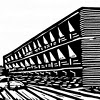Though the spotlight has been on the Moritz von Oswald Trio in which he performs, Sasu Ripatti formed his own experimental jazz quartet a few years ago. Having spent most of their time together gigging, the group has just recorded their debut album at what seems like the perfect time. By all accounts Ripatti’s drumming is one of the most impressive aspects of Moritz von Oswald’s acclaimed trio, and his own musical history begins with jazz drumming. Early hints about the new project stated that he would be using a traditional drum kit (instead of the sculptures and other oddities used for the trio), and that he would be drafting in Lucio Capece on clarinet, Derek Shirley on double bass and Mika Vainio on electronics to fill out the quartet. Perhaps it was naive to believe this meant the quartet’s debut LP on Honest Jon’s would be based in (somewhat) traditional jazz. Ripatti has never made a record that resembles anything else out there, but given his background and the increased interest in jazz in the techno/house scene, maybe the Vladislav Delay Quartet would make a full-fledged jazz record.
Pressing play immediately dispels all of those assumptions. “Minus Degrees, Bare Feet, Tickles” is one of the more shocking things Ripatti has made, a grating wall of pure analog noise conjured by Vainio, who’s probably the best in the business at that sort of thing. The noise slowly sets into a certain rhythm while the rest of the quartet stake out their sonic territory, and as the grating static recedes, Ripatti builds tension with his percussion. “Santa Teresa” is the calm after the storm, reminding of 2009’s Tummaa in its timbres and stunted, deliberate rhythmic pacing. Vladislav Delay Quartet was recorded over a week in Belgrade, and some of these tracks, such as “Santa Teresa” or “Des Abends” certainly sound like they could be almost pure live takes. Closer, repeated listening, however, reveals just how much processing and production has gone into each sound.
One of the album’s defining traits is its unpredictability, oscillating between airy cuts filled with identifiable acoustic instruments and nearly suffocating noise experiments. After a suite of slow, mostly spacious tunes, “Hohtokivi” plunges the listener back into a noisy, tense world defined by tenacious and fuzzy plucked bass tones. Just when you think you have the quartet’s world mapped out, “Louhous” startles with its almost industrial rhythms; a kind of rhythmic propulsion not heard anywhere else on the album. While the influences of electronic music and jazz can certainly be heard, Vladislav Delay Quartet‘s most impressive aspect lies in its unconventional approach. More than anything else this year, this is music that I’ve truly never heard before, and yet after giving it the time it demands, connections are formed that would be impossible to detect given just a cursory glance. It is an album that not only confounds expectations, but more importantly opens up sonic territories few have explored before.

















On some other shit….And i love it.